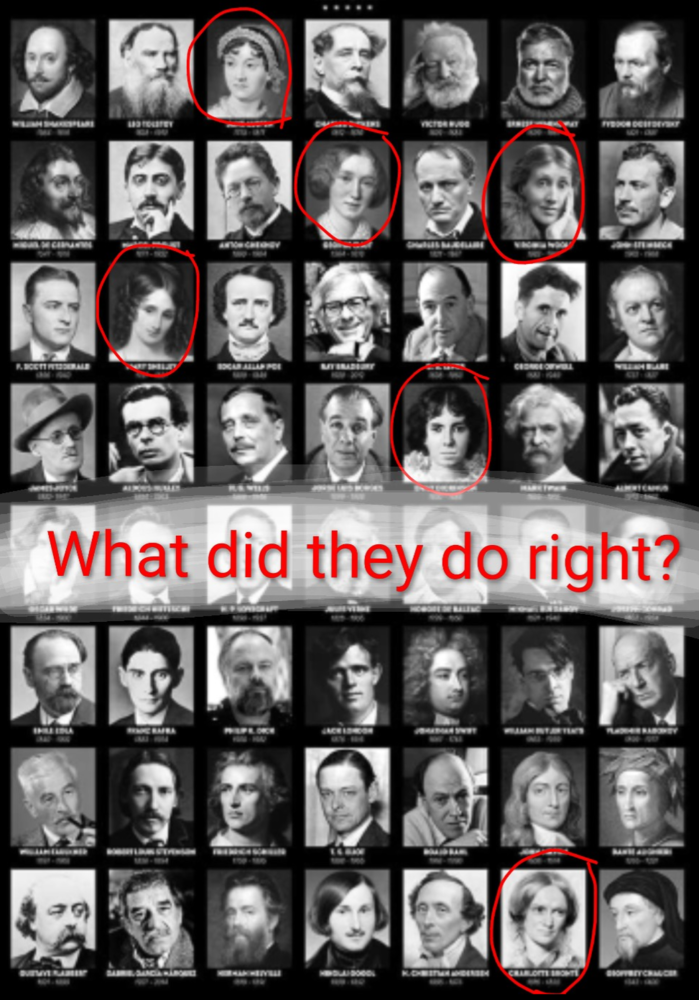While women's work may be practically and technically advanced in recent years, it is not being treated on the same emotional level as men’s work. Many critiques of women’s art-- including writing-- often stem from reasons related to a woman’s femininity. No one claims the same with men’s work. A work’s flaws, if created by a woman, are attributed to her femininity. A work's successes, if created by a woman, are in some way still attributed to her femininity.
No one is arguing that men have not made important contributions to these fields, but the idea that women have not, or have simply made contributions too small to note, is simply false. Women's work is not taught or analyzed with the same affection or interest. We must not distinguish-- a good work is a good work, regardless of gender.
There are some very specific works that are important (written by female artists and authors) simply because they tell the side of the story that has been historically stifled. They reveal or suggest something about being a woman that is important in some way. But this is a fraction of women's art! Work by men is never suggested to be simply a reflection of men as a whole. Of course, there are aspects that occasionally suggest a viewpoint is a very masculine one, but I have been surrounded by this viewpoint for my entire education. Let us read a short story written by a woman without it being because it is written by a woman or because it is about being a woman.
In the top 30 female-authored books assigned by college professors, almost all of them are related in some way to femininity. Many have more subjects within, or use femininity as a device in order to write about something larger. For example, the second most read story in US colleges is Their Eyes Were Watching God and is “told as a frame story where Janie recounts […] themes of love, race, [and] gender […]” Another story in the list, Mrs Dalloway by Virginia Woolf, “explores the complexities of a single day in a woman's life, using her party preparations as a frame to delve into themes of time, memory, social expectations, and mental health.” The last subjects listed certainly have merit. But are professors assigning this novel in order to explore themes of memory and mental health, or to simply fill a requirement? The Yellow Wallpaper, The Coquette, Pride and Prejudice, and The Handmaid's Tale are also included on the list. Every one of these novels says something about women as a whole (or tries to). These are very specific books, they predict or reminisce on the treatment of women, but these are their main theses. Men's work, on the other hand, almost never is read or taught in this way. By using and studying these materials, we perpetuate the idea that a female author is only viable if she is saying something about the female race.
Overall most read novels (or short stories) in each college course are listed by research through BookRiot, which include well-known titles (by men) such as 1984, Canterbury Tales, The Things They Carried, Paradise Lost, the Odyssey, and A Rose for Emily. Not one of these stories is thought to reflect on the behavior, the attitudes, or the actions of or against men at the time, but on the human race, war, love, dystopia, language, God and godlessness, violence and cruelty, and other large, important themes. I admit I am a fan of many of the titles listed in both the overarching category and the women-authored novels. I feel it is important, occasionally, to read a story such as The Yellow Wallpaper to understand the author and the treatment of women at that time. But is that all that female authors can be? Can they be only social and gender specific echoes of their time and biology when male authors are understood to be writing about much larger themes, unspecific to their gender? The era is no longer to blame. Women's history and viewpoints must certainly be taught, but not at the exclusion of greater, broader themes.
Information Sources: https://www.aauw.org/resources/article/fast-facts-academia/
https://www.ebsco.com/research-starters/literature-and-writing/mrs-dalloway-virginia-woolf

